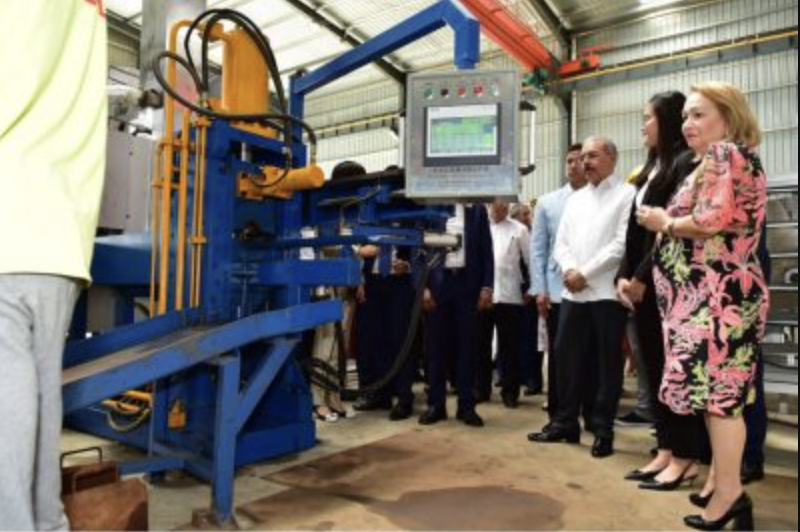
The locally-based Chinese-owned manufacturing plant, Kingtom Aluminio SRL is banned from exporting to the United States now that the US Customs and Border Protection has issued a Forced Labor Finding based on information that reasonably indicates the use of forced labor in violation of 19 U.S.C. § 1307 in the production of the merchandise. Effective immediately, CBP personnel at all US ports of entry are ordered to seize aluminum extrusion and profile products manufactured by Kingtom Aluminio SRL upon entry. The company manufactures aluminum extrusions and profiles that are used widely to build transportation and construction products, furniture, electronics, and more.
The Kingtom Aluminio located in Santo Domingo province is the largest aluminum extrusion plant in the Caribbean region with a total area of 120,000㎡. The plant manufactures aluminum architecture and industrial profiles. The company website says that Kingtom Aluminio has the complete process to produce aluminum profiles: casting, extrusion, powder coating, anodizing, wood grain, fabrication, thermal brake and package.
President Danilo Medina had attended the inauguration of the plant in April 2018, shortly before his government established full official government relations with the People’s Republic of China (1 May 2018). The company operates at the Zona Franca Industrial Riosur located at Carretera Mella Km.36, San Martin De Guerra, in Santo Domingo province.
The company operates by recycling and purchasing aluminium on the local market for use in its manufacturing operations. From the start, its target market has been the United States and Puerto Rico.
To order the ban, the US CBP identified the following International Labour Organization forced labor indicators during its investigation of Kingtom Aluminio SRL: abuse of vulnerability, intimidation and threats, deception, withholding of wages, physical and sexual violence, restriction of movement, and excessive overtime.
The Aluminum Extruders Council (AEC) and the United Steel, Paper and Forestry, Rubber, Manufacturing, Energy, Allied Industrial and Service Workers International Union (USW) petitioned CBP and DHS to investigate Kingtom.
Diario Libre reports that two years ago, the Ministry of Labor of the Dominican Republic had notified the company of labor violations and ordered the company to paralyze its operations in May 2022. A second notification was issued in July 2024 for the reported “abusive” labor practices.
Now, the United States Customs and Border Protection (CBP), with the approval of the US Department of Homeland Security (DHS), determined that aluminum extrusions and profile products imported from a Dominican Republic factory were manufactured through the use of forced labor.
According to CBP’s findings, Kingtom Aluminio SRL used convicts and forced or indentured labor to manufacture aluminum products that were then imported into the U.S. in violation of Section 307 of the Tariff Act of 1930.
The Tariff Act states that “all goods, wares, articles and merchandise mined, produced or manufactured wholly or in part in any foreign country by convict labor or/and forced labor or/and indentured labor under penal sanctions shall not be entitled to entry at any of the ports of the US, and the importation thereof is hereby prohibited.”
Kingtom is a Chinese-owned aluminum extruder in the Dominican Republic that uses Chinese and local Dominican labor. The Aluminum Extruders Council (AEC) and the United Steel, Paper and Forestry, Rubber, Manufacturing, Energy, Allied Industrial and Service Workers International Union (USW) had petitioned CBP and DHS to investigate Kingtom.
Based on CBP’s determination, port directors can seize aluminum extrusions from Kingtom for violating 19 U.S.C. 1307 and start forfeiture proceedings. This is unless Kingtom establishes evidence that the merchandise was not produced or manufactured using prohibited labor.
“[The] announcement is the culmination of a joint effort between AEC and USW and sends a powerful message that forced labor has no place in global supply chains,” says AEC president Jeff Henderson. “AEC has consistently advocated for rigorous enforcement of trade laws, including those that uphold ethical labor standards. We commend CBP for their diligence in uncovering and addressing this violation and for taking concrete steps to ensure compliance.”
Read more:
Diario Libre
Diario Libre
Business Wire
US Public Inspection
Howard Precision
American Journal of Transportation
Al Momento
9 December 2024

